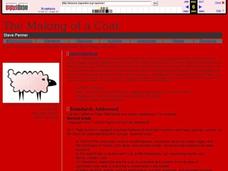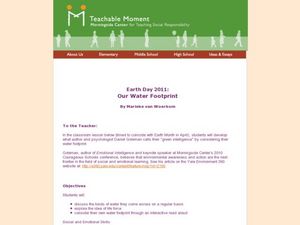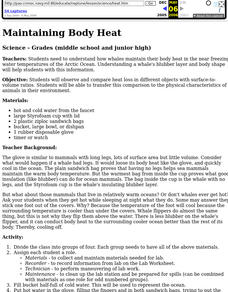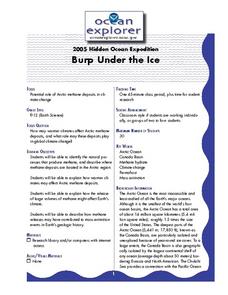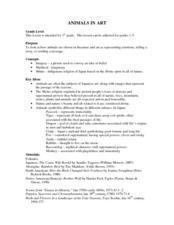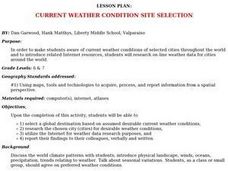Curated OER
Life in the Kelp Forest
Students research and create a marine food web to learn about plants and animals in a kelp forest. In this marine food web lesson, students draw lines between kelp forest predators and prey and show the flow of energy in the food web....
Curated OER
Earth's Land and Water
Pupils describe physical characteristics of bodies of water and landforms. In this land and water lesson plan, students model land and water with modeling clay and also discuss why people live near bodies of water.
Curated OER
The Exploration and Settlement of North America
Young scholars locate place in Canada and explore highlights of early of early American exploration and settlement. In this North American history lesson, students locate provinces, major cities, and physical features of Canada. Young...
Curated OER
The Making of a Coat
Students read the story A New Coat For Anna and discuss their knowledge on how to make a coat. In this reading and coat making lesson plan, students discuss coat making and listen to a speaker that spins thread to make coats.
Curated OER
Water Pollution
Students explore the causes of water pollution. In this environmental lesson, students conduct experiments with natural filtration systems.
Curated OER
Our Water Footprint
Pupils discuss the water usage of the world and their own water usage. In this water lesson plan, students read a story about water and discuss different statistics of water usage around the world.
Curated OER
People power
High schoolers explore about the British ban on slave trading and compare it to high profile campaigns today. They discuss what motivates people to behave in this way? What do students want to change, and how would they go about doing...
Curated OER
Maintaining Body Heat
Students observe and compare heat loss in different objects with surface-to-volume ratios. They transfer this comparison to the physical characteristics of animals in their environment. They focus on how whales maintain their body heat.
Curated OER
How Did This Happen?
Students use websites and discussion to investigate the 2004 Asian Tsunami. Students identify the Indian Ocean coastline's physical, political and human geography features and consider how they affected loss of life and property in those...
Curated OER
Coming to California
Fourth graders read excerpts from Juan Bautista de Anza's diaries. They analyze the impact of primary sources. They write journal entries for characters in stories they have read during the year.
Curated OER
Burp Under the Ice
Students examine the impact of climate warming on Arctic methane deposits. They identify natural methane processes and describe how this contributes to species extinction. They write reports on their findings.
Curated OER
Getting to the Bottom
Pupils identify taxa in Arctic benthic communities. They discover organisms that live in these Arctic areas. They analyze data compiled for the Canada Basin Benthic Samples, 2002.
Curated OER
Friendship Mobiles
Students discuss how the sun, wind, clouds and other elements of nature can be their friends. They create mobile demonstrating this.
Curated OER
What is an Estuary?
Students define the terms estuary and watershed. They conduct an experiment to determine the density differences between fresh and saltwater. They examine the salinity distribution of the Peconic Bay Estuary.
Curated OER
Survival in the Open Ocean
Students examine how scientists conduct pelagic research and identify pelagic predators as they study the open-ocean ecosystem. They discuss and conduct small group research of this environment in order to produce a presentation.
Curated OER
Animals in Art
Young scholars look at how animals are shown in literature and art as representing emotions, telling a story, or sending a message in this elementary school Language Arts and Visual Arts lesson.
Curated OER
Current Weather Condition Site Selection
Students work together to agree on the days "preferred weather conditions." They choose a city in the world they think will have the preferred current weather conditions.
Curated OER
Old English: Pirate Slang
Students review a list of slang used by pirates and then compile a list of slang that they use in their everyday language. They discuss which examples of slang should be included in the dictionary and in which contexts slang is appropriate.
Curated OER
Famous Quotes and Mottos
Students read about the accomplishments of John Paul Jones and the Continental Marines. They explore famous quotes and mottos, i.e. "Semper Fidelis." Students discuss other quotes or mottos by famous people in history. They discuss...
Curated OER
Science: Not just Gold
Learners articulate a possible relationship between arsenic and gold deposits in a written statement using data to substantiate the relationship they describe. They use real data to determine the source of the arsenic in the drinking...
Curated OER
When is Dinner Served? Predicting the Spring Phytoplankton Bloom in the Gulf of Maine (College Level)
Students are able to explain the ecological importance of phytoplankton. They describe the components that influence a phytoplankton bloom. Students interpret satellite images in order to correlate buoy data.
Curated OER
Water Quality Monitoring
Students comprehend the four parameters of water quality. They perform tests for salinity, dissolved oxygen, pH and clarity or turbidity. Students comprehend why scientists and environmental managers monitor water uality and aquatic...
Curated OER
Wind
Students complete activities to study wind intensity. In this wind study lesson, students discuss wind speed and direction. Students then build a kite and windsock to help them study wind intensity. Students learn to use a wind meter for...
Curated OER
Tooling Around Arizona: Reading Arizona Maps
Students study geography. In this Arizona maps lesson, students develop their map reading skills. They have class discussions and work independently with various copies of Arizona maps to practice those skills. This lesson mentions...
Other popular searches
- Continents and Oceans
- Continents Oceans
- Oceans and Seas
- Oceans of the World
- 7 Continents and Oceans
- Oceans and Climate
- Lesson Plans on Oceans
- Salty Oceans
- Salinity in the Oceans
- Lessons on Oceans
- Extent of Oceans
- Oceans and Climate Change





